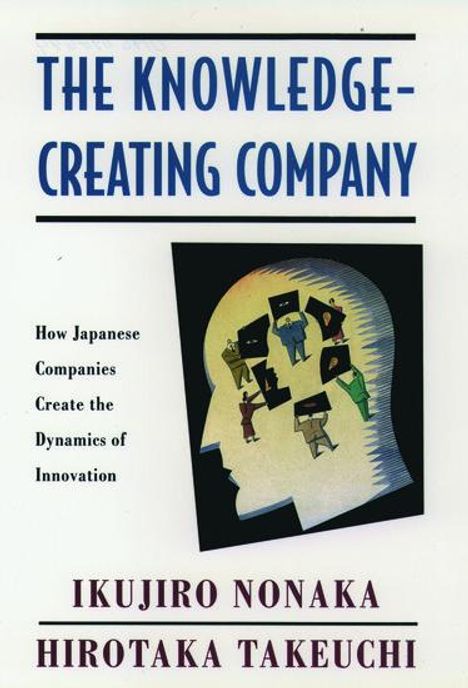Ikujiro Nonaka: The Knowledge-Creating Company, Gebunden
The Knowledge-Creating Company
- How Japanese Companies Create the Dynamics of Innovation
(soweit verfügbar beim Lieferanten)
- Verlag:
- Oxford University Press, 07/2024
- Einband:
- Gebunden
- Sprache:
- Englisch
- ISBN-13:
- 9780195092691
- Artikelnummer:
- 5178649
- Copyright-Jahr:
- 1995
- Gewicht:
- 603 g
- Maße:
- 241 x 156 mm
- Stärke:
- 25 mm
- Erscheinungstermin:
- 15.7.2024
- Hinweis
-
Achtung: Artikel ist nicht in deutscher Sprache!
Klappentext
Two leading Japanese business experts, Ikujiro Nonaka and Hirotaka Takeuchi, are the first to tie the performance of Japanese companies to their ability to create new knowledge and use it to produce successful products and technologies. In The Knowledge-Creating Company, Nonaka and Takeuchi provide an inside look at how Japanese companies go about creating this new knowledge organizationally. The authors point out that there are two types of knowledge: explicit knowledge, contained in manuals and procedures, and tacit knowledge, learned only by experience, and communicated only indirectly, through metaphor and analogy. U. S. managers focus on explicit knowledge; the Japanese, on the other hand, focus on tacit knowledge. And this, the authors argue, is the key to their success - the Japanese have learned how to convert tacit into explicit knowledge. To explain how this is done - and illuminate Japanese business practices as they do so - the authors range from Greek philosophy to Zen Buddhism, from classical economists to modern management gurus, illustrating the theory of organizational knowledge creation with case studies drawn from such firms as Honda, Canon, Matsushita, NEC, Nissan, 3M, GE, and even the U. S. Marines. In addition, the authors show that, to create knowledge, the best management style is neither top-down nor bottom-up, but rather what they call "middle-up-down", in which the middle managers form a bridge between the ideals of top management and the chaotic realities of the frontline. As we make the turn into the twenty-first century, a new society is emerging. Peter Drucker calls it the "knowledge society", one that is drastically different from the "industrial society",and one in which acquiring and applying knowledge will become key competitive factors. Nonaka and Takeuchi go a step further, arguing that creating knowledge will become the key to sustaining a competitive advantage in the future. Because the competitive environment and customer preferences change constantly, knowledge perishes quickly. With The Knowledge-Creating Company, managers have at their fingertips years of insight from Japanese firms that reveal how to create new knowledge organizationally, and how to exploit it to make successful products, services, and systems.
Biografie (Ikujiro Nonaka)
Ikujiro Nonaka ist emeritierter Professor an der Hitotsubashi-Universität in Tokio sowie Xerox Distinguished Faculty Scholar an der University of California, Berkeley.Biografie (Hirotaka Takeuchi)
Hirotaka Takeuchi ist Professor an der Hitotsubashi-Universität in Tokio.

